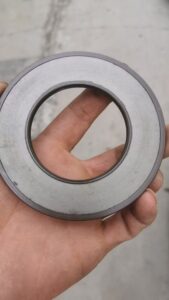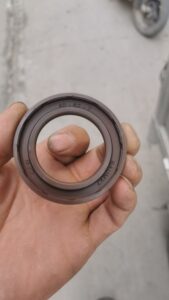Table of Contents
ToggleWhat Are Viton Seals Good For?
Viton® (fluorocarbon rubber, or FKM) seals are engineered to excel in demanding environments where extreme temperatures, aggressive chemicals, and long-term durability are critical. Their unique fluoropolymer structure provides unmatched performance in applications where standard elastomers like nitrile (NBR) or silicone (VMQ) fail. Below is a detailed exploration of Viton seals’ capabilities, ideal use cases, and practical considerations.



1. Core Strengths of Viton Seals
Viton’s superiority stems from its fluorocarbon backbone, which delivers:
- High-Temperature Resilience:
- Continuous operation in -20°C to +200°C (short-term up to 250°C), outperforming most rubbers in heat-intensive settings like engines or industrial ovens.
- Exceptional Chemical Resistance:
- Resists oils, fuels, acids (e.g., sulfuric, hydrochloric), hydrocarbons, and aggressive solvents (e.g., benzene, chlorinated chemicals).
- Low Compression Set:
- Maintains elasticity and sealing force even after prolonged compression, ensuring reliability in cyclic or static applications.
- Weather and Ozone Resistance:
- Withstands UV exposure, ozone degradation, and weathering, making it suitable for outdoor or harsh industrial environments.
2. Key Applications: Where Viton Shines
A. Automotive and Aerospace
- Fuel Systems:
- Fuel injector seals, fuel line O-rings, and tank gaskets (resistant to gasoline, diesel, biofuels, and ethanol blends).
- Engine Components:
- Valve stem seals, turbocharger gaskets, and exhaust system seals (handles high heat and oil exposure).
- Aerospace:
- Hydraulic systems, fuel line seals, and cabin pressure seals (tolerates aviation fuels and extreme temperature cycles).
B. Oil, Gas, and Chemical Processing
- Refineries and Pipelines:
- Seals for pumps, valves, and flanges exposed to crude oil, sour gas (H₂S), and hydrocarbon mixtures.
- Chemical Reactors:
- Gaskets in equipment handling acids, alkalis, chlorinated solvents, and ketones (using specialized grades like ETP).
C. Industrial Machinery
- Hydraulic/Pneumatic Systems:
- Piston seals, rod seals, and O-rings in high-pressure systems (up to 800 bar).
- High-Temperature Equipment:
- Steam valves, autoclaves, and heat exchangers requiring thermal stability.
D. Specialty Applications
- Pharmaceutical and Food Processing:
- Compatible with sterilization processes (e.g., autoclaving at 121°C).
- Semiconductor Manufacturing:
- Seals for vacuum systems and chemical vapor deposition (CVD) equipment.
3. Viton Grades: Tailored for Specific Needs
Different Viton formulations address niche challenges:
- Standard FKM:
- General-purpose use in temperatures up to 200°C (e.g., automotive fuel systems).
- GLT Grade:
- Extended low-temperature performance (-45°C), ideal for refrigeration or cryogenic systems.
- ETP Grade:
- Enhanced resistance to ketones, amines, and esters for harsh chemical environments.
- High-Fluorine Grades:
- Superior resistance to biofuels, bioethanol blends, and aggressive hydrocarbons.
4. Limitations and Trade-offs
While Viton is versatile, certain constraints apply:
- Low-Temperature Limitations:
- Standard Viton stiffens below -15°C; GLT grades are required for sub-zero applications.
- Chemical Compatibility Gaps:
- Avoid prolonged exposure to hot amines, esters, and glycol-based fluids (consult compatibility charts).
- Cost Considerations:
- More expensive than Nitrile or EPDM, but cost-effective in critical applications where failure is not an option.
5. Viton vs. Common Elastomers: A Quick Comparison
| Property | Viton (FKM) | Nitrile (NBR) | Silicone (VMQ) |
| Max Temperature | 200–250°C | 120°C | 230°C |
| Chemical Resistance | Excellent (oils, fuels) | Good (oils, water) | Poor (hydrocarbons) |
| Low-Temperature | Moderate (-20°C) | Good (-40°C) | Excellent (-60°C) |
| Cost | High | Low | Moderate |
6. When to Choose Viton Seals
- Opt for Viton if:
- Operating in high-temperature environments (e.g., engines, industrial furnaces).
- Exposure to aggressive chemicals, fuels, or oils (e.g., refineries, chemical plants).
- Long-term reliability is critical (e.g., aerospace hydraulics, pharmaceutical sterilization).
- Consider alternatives if:
- Temperatures drop below -20°C (unless using GLT grades).
- Budget constraints outweigh performance needs (e.g., low-pressure water systems).
Key Takeaways
- Viton seals excel in high-heat, chemically aggressive, and fuel/oil-exposed environments.
- Specialized grades (GLT, ETP) address extreme temperatures or chemical challenges.
- Always verify compatibility with operational media and temperatures using manufacturer datasheets.
- For ultra-extreme conditions (e.g., >250°C, plasma exposure), consider advanced alternatives like Kalrez® (FFKM) or Aflas® (FEPM).
By leveraging Viton’s strengths and mitigating its limitations, engineers can ensure reliable sealing performance in the most demanding industrial, automotive, and aerospace applications. Its balance of durability, chemical resistance, and thermal stability makes it indispensable where failure is not an option.



Leave A Comment